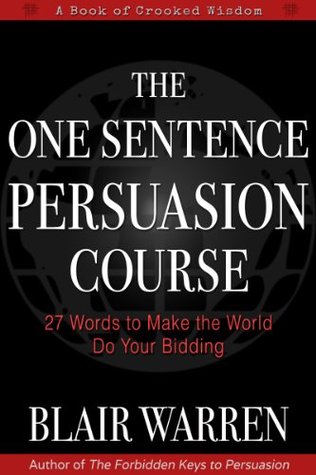More on this book
Community
Kindle Notes & Highlights
encourage their dreams justify their failures allay their fears
confirm their suspicions help them throw rocks at their enemies
the duration of our relationships is nothing compared to the depth of our relationships. And depth is based on the fulfillment of our deepest needs, not on the duration of dialog.
“You are the only one who creates your reality. For no one else can think for you. No one else can do it. It is only you. Every bit of it. You.”
If I had to boil down the strategy behind One Sentence Persuasion even more than I already have, it would be this: Validate and fascinate.
Unless our current thoughts or activities are sufficiently engaging, the next best thing that comes along will pull us away. And since it’s through engagement that we experience and through experience that we are changed, those who engage us hold the keys to our hearts and minds, and from there, our actions. We do not see these people as manipulators. We see them as saviors.
“What holds attention determines action.” ~ William James
No matter how unskilled or unpolished you may be, if you can capture and hold another person’s attention long enough, they will eventually fold to your command. Why? Because when our attention is captured, our conscious judgment and self-awareness recedes and suggestibility takes their place.
As powerful as the two-word strategy “validate and fascinate” is, the next strategy is even more powerful. But in a negative way. This two-word strategy is: Correct and convince.
Perhaps the greatest irony of all when it comes to validating these needs is that when we are allowed to have these needs and even indulge them, we often don’t. The very fact that it is okay for us to feel a certain way encourages us to stop fighting to maintain and justify our feeling that way. When we’re told it is okay to dream, we tend to be more flexible with our dreams. When we’re told we’re not responsible for something, we often find that we’re more open to accepting responsibility for it. When we’re told that it’s okay to be afraid, we often feel less afraid. When we’re told that
...more


